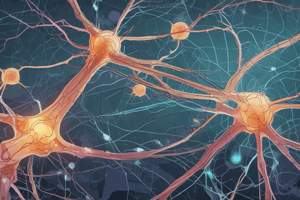Podcast
Questions and Answers
What factor does NOT influence the strength of a nerve signal?
What factor does NOT influence the strength of a nerve signal?
- The frequency of action potentials
- The strength of a single action potential (correct)
- The size of the axon diameter
- The number of neurons stimulated
Why can a nerve impulse not travel backwards?
Why can a nerve impulse not travel backwards?
- The previous node is in a refractory period. (correct)
- The impulse is too weak to travel backwards.
- Myelination prevents backward travel.
- The action potentials only flow in one direction.
Which process describes how action potentials travel faster in myelinated neurons?
Which process describes how action potentials travel faster in myelinated neurons?
- Continuous conduction
- Saltatory conduction (correct)
- Neurotransmitter release
- Exocytosis
What is the role of neurotransmitters at the synapse?
What is the role of neurotransmitters at the synapse?
What occurs first when an action potential arrives at the presynaptic terminal?
What occurs first when an action potential arrives at the presynaptic terminal?
Flashcards are hidden until you start studying
Study Notes
Signal Strength and Nerve Impulses
- Signal strength varies based on the number of neurons stimulated and the frequency of action potentials (APs).
- The strength of an individual AP remains constant.
Action Potential Propagation
- Nerve impulses consist of a series of action potentials.
- At a node of Ranvier, sodium ions (Na+) flow into the axon, causing depolarization.
- After Na+ influx, Na+ pumps close, and Na+ diffuses along the axon in both directions.
- The next node becomes depolarized due to the increased positive charge, triggering another AP.
- Impulses cannot reverse direction due to the refractory period at previous nodes.
Saltatory Conduction
- Myelinated cells exhibit saltatory conduction, where action potentials jump between nodes of Ranvier.
- This allows for significantly faster impulse transmission compared to non-myelinated fibers.
- A larger axon diameter enhances impulse speed; myelination effectively increases the axon's diameter.
Synapses
- A synapse is the connection between two neurons or a neuron and an effector.
- Nerve impulses travel to synaptic terminals, where a synaptic cleft exists between neurons.
Neurotransmitter Function
- Neurotransmitters are chemical messengers that facilitate signal transmission across the synaptic cleft.
- Sequence of events at the synapse:
- AP reaches the presynaptic neuron's end.
- Synaptic vesicles containing neurotransmitters undergo exocytosis, fusing with the axon membrane.
- Neurotransmitters are released into the synaptic cleft.
- They bind to receptor proteins on the postsynaptic membrane, opening ion channels.
- If depolarization reaches the threshold, an AP is initiated in the next neuron.
Studying That Suits You
Use AI to generate personalized quizzes and flashcards to suit your learning preferences.



